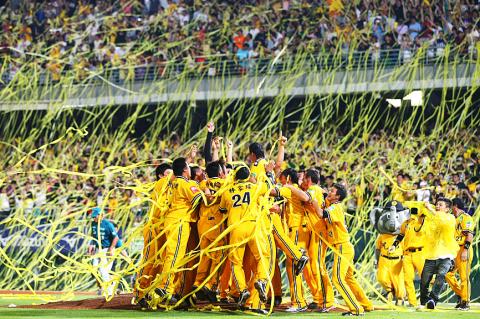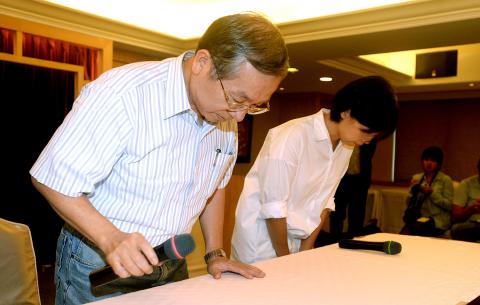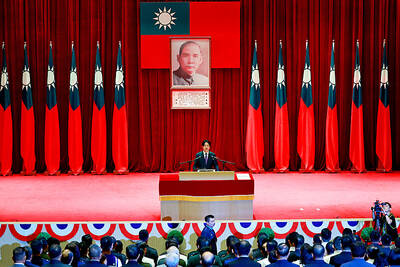The owners of the Brother Elephants (兄弟象) Chinese Professional Baseball League (CPBL 中華職棒) team yesterday announced that they are unable to absorb mounting financial losses and have put the team up for sale, while requesting the government’s help to seek a buyer.
“I hereby announce the painful decision, made at our board of directors meeting on Friday, that the Brother Elephants club will head into history,” Brother Elephants chairman Hung Jui-ho (洪瑞河) said, as he and his daughter, Brother Elephants general manager Hung Yun-ling (洪芸鈴), stood and bowed in a gesture of apology to baseball fans.
“We hope to find a new owner by the end of this year,” he said, adding that he welcomes large conglomerates with solid financial bases to contact him to negotiate a deal.

Photo: CNA
“If we are unable to find a suitable buyer by the end of this year, then the Brother Elephants will play one more season in the league. We hope to have a buyer for the ball club next year,” Hung said.
The news that the Hung family was putting the Brother Elephants franchise up for sale, although it had been rumored for some time, nonetheless comes as a big shock to Taiwan’s sports community.
Baseball fans and players were buzzing following the announcement. On the CPBL’s Web site, supporters of the Elephants expressed their sadness, saying it was the end of an era in Taiwanese baseball, and thanked the team for bringing them many happy memories.

Photo: Lin Cheng-kung, Taipei Times
One netizen using the name “Brother Soul” (兄弟魂) wrote: “I will continue to support the ball club under a new name, because the team spirit will always remain.”
Other fans said they are glad of the development, because the Hung family did not have the financial clout to compete against the other CPBL franchise owners, who have deep pockets.
One netizen called “Wuwo” (無我) said the small-market mentality of the Hung family has been impeding the progress of professional baseball in Taiwan, such as building up a proper free-agency system, minor league teams and a real home-and-away structure with ballparks in each team’s home cities.
Hung said that a deciding factor was the NT$1 billion (US$34 million) in losses the team has suffered through its 24 years in pro baseball.
“In the beginning, we estimated the yearly operating deficit would be only between NT$10 million and NT$20 million, but we just cannot absorb the current yearly losses ranging between NT$40 million and NT$50 million,” he said. “So it is time for us to take a rest. There are many business groups in Taiwan who are bigger than our Hung family’s Brother Hotel. So we wish to find a buyer who is genuinely interested and willing to invest in pro baseball.”
The list of potential buyers are said to include some of Taiwan’s top companies: HTC (宏達電), Hon Hai / Foxconn Technology Group (鴻海集團), Cathay Financial Holding Co (國泰集團), CTCB Financial Holding Co (中信集團) and Wei Chuan Food Corp (味全公司).
Analysts put the value of the Brother Elephants franchise at between NT$300 million and NT$500 million, which is at least twice the value of the NT$130 million sale of the Sinon Bulls (興農牛) franchise to EDA Group (義大集團) last year.
According to a report in Taiwan’s Chinese-language China Times newspaper, the Hung family have already attracted interest from business groups in China.
The report said a high-value deal has been offered by Beijing-based Huayi Brothers Media Corp (華誼兄弟傳媒集團), a Chinese conglomerate involved in movies, music, television and entertainment.
However, Hung said his family is strongly opposed to selling the franchise to any Chinese company.
“If a big conglomerate from China wants to buy this team, we would just disband and fold the ball club. The team will not have Chinese owners,” he was quoted as saying.
Instantly recognizable in their all-yellow uniforms, the Brother Elephants are said to be the most popular team in Taiwan, and have won seven CPBL championship crowns. Their fans are called the “Yellow Jersey Army” (黃衫軍) and don various shades of yellow clothes.
The Brother Elephants and the Uni-President Lions (統一獅) were two of the original founding ballclubs when the CPBL was launched in 1990, and are the only surviving teams. The other two founding clubs of the CPBL were the Weichuan Dragons (味全龍) and the Mercury Tigers (三商虎), both of which folded at the end of the 1999 season.
The other two teams in the league are the Kaohsiung-based EDA Rhinos (義大犀牛) and the Taoyuan-based Lamigo Monkeys (Lamigo桃猿).

TPP RALLY: The clashes occurred near the Chiang Kai-shek Memorial Hall on Saturday at a rally to mark the anniversary of a raid on former TPP chairman Ko Wen-je People who clashed with police at a Taiwan People’s Party (TPP) rally in Taipei on Saturday would be referred to prosecutors for investigation, said the Ministry of the Interior, which oversees the National Police Agency. Taipei police had collected evidence of obstruction of public officials and coercion by “disorderly” demonstrators, as well as contraventions of the Assembly and Parade Act (集會遊行法), the ministry said in a statement on Sunday. It added that amid the “severe pushing and jostling” by some demonstrators, eight police officers were injured, including one who was sent to hospital after losing consciousness, allegedly due to heat stroke. The Taipei

NO LIVERPOOL TRIP: Taiwan’s Lin Yu-ting, who won a gold medal in the boxing at the Paris Olympics, was embroiled in controversy about her gender at that event Taiwanese boxer Lin Yu-ting (林郁婷) will not attend this year’s World Boxing Championships in Liverpool, England, due to a lack of response regarding her sex tests from the organizer, World Boxing. The national boxing association on Monday said that it had submitted all required tests to World Boxing, but had not received a response as of Monday, the departure day for the championships. It said the decision for Lin to skip the championships was made to protect its athletes, ensuring they would not travel to the UK without a guarantee of participation. Lin, who won a gold medal in the women’s 57kg boxing

The US has revoked Taiwan Semiconductor Manufacturing Co’s (TSMC, 台積電) authorization to freely ship essential gear to its main Chinese chipmaking base, potentially curtailing its production capabilities at that older-generation facility. American officials recently informed TSMC of their decision to end the Taiwanese chipmaker’s so-called validated end user (VEU) status for its Nanjing site. The action mirrors steps the US took to revoke VEU designations for China facilities owned by Samsung Electronics Co and SK Hynix Inc. The waivers are set to expire in about four months. “TSMC has received notification from the US Government that our VEU authorization for TSMC Nanjing

CHINESE INCURSIONS, SORTIES: President William Lai thanked military officers for shouldering the responsibility of defending the survival and development of Taiwan President William Lai (賴清德) yesterday said that aggression would inevitably fail, pointing — on the day before a mass military parade in Beijing — to the lessons from World War II and key victories Taiwan claims against Chinese forces in 1958. Taiwan has over the past five years repeatedly complained about heightened Chinese military activity including war games around the nation as Beijing steps up pressure to enforce territorial claims that Taipei rejects. Chinese President Xi Jinping (習近平), flanked by Russian President Vladimir Putin and North Korean leader Kim Jong-un, are to oversee a military parade in Beijing today to mark the